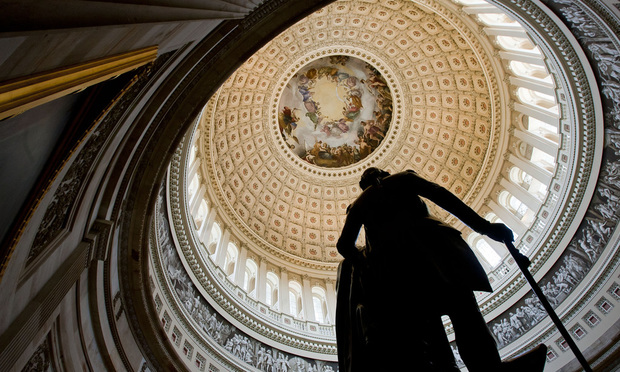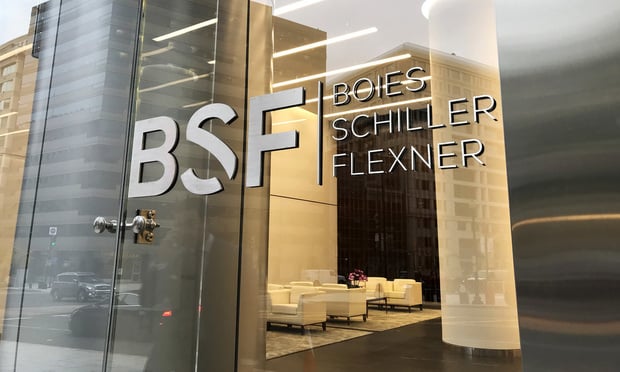How Major US Firms Prepared House Impeachment Witnesses
"For these folks caught in crossfire between two political parties and two branches of government, there aren't firm answers on the legal questions," one lawyer says. Public impeachment proceedings begin Wednesday.
November 12, 2019 at 07:06 PM
7 minute read
 The Rotunda at the U.S. Capitol in Washington, D.C. Photo: Diego M. Radzinschi/ALM
The Rotunda at the U.S. Capitol in Washington, D.C. Photo: Diego M. Radzinschi/ALM
On a Monday evening last month, in the waning hours of her daylong deposition in the House impeachment inquiry, Fiona Hill addressed the conspiracy theories that swirled around her tenure as President Donald Trump's adviser on Russia and Europe.
Hill recalled accusations, spread on the far-right website InfoWars, that she was a "mole" planted by the Democratic mega-donor George Soros. With the impeachment inquiry picking up, Hill testified that she was now "out on InfoWars again."
Within moments, Hill's lawyer Lee Wolosky cut in. At Hill's mention of InfoWars and Soros, Wolosky said he saw Steve Castor, a top lawyer and investigator for House Republicans, laugh. Wolosky, a partner at the law firm Boies Schiller Flexner, wanted that response to be recorded in the deposition transcript.
"That is an outrageous—that is outrageous to say that I laughed at that," Castor said.
"You did laugh, and I want the record to reflect it because this is a very serious matter where people's lives potentially are in danger," Wolosky responded, referring to death threats and harassing calls Hill has received. "And it's not a laughing matter."
Castor continued to dispute Wolosky's claim, saying it was an "absolutely ridiculous characterization." But Wolosky's objection would be reflected in the record, living on in the publicly released transcript of Hill's deposition.
The tense exchange offered a glimpse into how lawyers have negotiated, in real time, the curves thrown by the House impeachment probe, an inquiry that has focused on whether Trump abused his power in leveraging U.S. military aid to pressure Ukraine to investigate former Vice President Joe Biden and his son Hunter.
After playing out for weeks behind closed doors, the impeachment inquiry is set to spill out into public view Wednesday, with William Taylor, a former ambassador to Ukraine, and career diplomat George Kent both appearing before the House Intelligence Committee. A K&L Gates team has advised Kent, and lawyers from Arnold & Porter Kaye Scholer have represented Taylor.
Marie Yovanovitch, a former U.S. ambassador to Ukraine, is slated to testify publicly Friday. She is represented by Lawrence Robbins of Washington's Robbins, Russell, Englert, Orseck, Untereiner & Sauber.
In interviews, lawyers involved in the impeachment inquiry described numerous challenges in navigating the House impeachment inquiry, a high-pressure proceeding rife with murky legal questions and rules unfamiliar even to experienced defense attorneys.
"For these folks caught in crossfire between two political parties and two branches of government, there aren't firm answers on the legal questions, and that makes it really difficult," said one lawyer. "The law itself is contested."
In court, top Trump administration officials have sought clarity on whether they should comply with House subpoenas demanding their testimony or follow the White House's instructions not to testify.
 Boies Schiller Flexner offices in Washington, D.C. Photo: Diego M. Radzinschi/ALM
Boies Schiller Flexner offices in Washington, D.C. Photo: Diego M. Radzinschi/ALMAhead of Hill's testimony, Wolosky exchanged letters with the White House counsel's office concerning the extent to which executive privilege would apply to the former National Security Council official's testimony. Because the House's rules bar administration officials from sitting in on the questioning, it fell to Hill and her lawyer to avoid divulging information that might be privileged.
"It becomes the responsibility of the witness's lawyer to figure that out," Wolosky said in an interview Tuesday. "That is completely odd-ball stuff since you don't hold the privilege—very different from any deposition most lawyers will encounter."
In preparation for the public phase of the impeachment inquiry, lawyers said they have scoured transcripts of the closed-door depositions, looking for narratives particular lawmakers might seek to explore during their questioning. The Trump administration's refusal to provide documents has limited the ability of some witnesses to refresh their recollections of the events in question, requiring them to draw from memory—and take proper precautions in doing so.
"This is not an adjudication where we win the case, we defeat a claim or win a judgment. This is an exercise in surviving what is going to be an uncomfortable day for every witness that gets up there," one lawyer said. "You're really just trying to absorb and be resilient, appropriately caveat answers and not create discomfort that transcends the hearing."
The House rules allow the top members of the House Intelligence Committee—the panel's chairman, U.S. Rep. Adam Schiff, and the ranking member, U.S. Rep. Devin Nunes—to yield time to counsel during an initial 45-minute round of questioning. Castor will be on hand to conduct questioning during Nunes' allocated time. For the Democrats, Daniel Goldman, a former federal prosecutor in Manhattan, is expected to conduct much of the questioning.
Following the extended questioning, there will be alternative five-minutes rounds of questioning by Democratic and Republican committee members.
The House's impeachment inquiry set off a scramble for lawyers, the likes of which was last seen during the special counsel investigation of Russia interference in the 2016 presidential election. Major U.S. law firms—including Paul Hastings, Akin Gump Strauss Hauer & Feld, Squire Patton Boggs and White & Case—have advised current or former U.S. officials amid the impeachment inquiry.
Paul Hastings partners Robert Luskin and Kwame Manley represent Gordon Sondland, the U.S. ambassador to the European Union. Taylor is represented by Arnold & Porter partner John Bellinger, who served under the George W. Bush administration as the State Department legal adviser. Kent is being advised by K&L Gates partners Andrew Wright and Barry Hartman.
Transcripts of the closed-door depositions reveal varying approaches from the lawyers, their styles ranging from hands off to highly active and, in some instances, adversarial.
 Lawrence Robbins of Robbins, Russell, Englert, Orseck, Untereiner & Sauber. April 26, 2010. Photo: Diego M. Radzinschi /ALM
Lawrence Robbins of Robbins, Russell, Englert, Orseck, Untereiner & Sauber. April 26, 2010. Photo: Diego M. Radzinschi /ALMIn the transcript of Yovanovitch's deposition, Robbins repeatedly stepped in to clarify questions or relay the privilege the State Department was asserting over internal communications. At another point, when Castor inquired about how the Washington Post obtained an advance copy of Yovanovitch's opening statement, Robbins stepped in to head off an answer.
"Anything she would know about that, she would know through counsel, so she's not going to answer that," Robbins said.
The lawyers also kept an eye on the clock—and repeated questions. In the more than nine-hour deposition of Sondland, Luskin pushed back against U.S. Rep. Lee Zeldin, R-New York, when he pressed the ambassador over his view about Trump's effort to pressure Ukraine to investigate former Vice President Joseph Biden and his son Hunter.
Sondland said he was not a lawyer and that the propriety of Trump's conduct depended on whether it was legal. "That's the best I can give you," Sondland said. "It's really a question of law."
Zeldin said he was trying to reconcile "two completely different answers" from Sondland, prompting Luskin to point out the length of the deposition.
"With all respect, congressman, we've now been here for eight and a half hours and Ambassador Sondland has not declined to answer a single question posed by any member or any counsel member," Luskin said. "You've asked this question now three different times. I know you're unhappy with his answer, but if we stay until 7:30 he's not going to change his answer."
Read more:
Mulvaney Will Obey Trump and Defy House Impeachment Subpoena
House Attorneys Prepare to Go Public in Impeachment Hearings
'Let's Motor Through, Chairman': How Robert Luskin Guided Gordon Sondland
'Barely-Lawyered Temper Tantrum': What Lawyers Said About Cipollone's Letter
16 Conservative Lawyers Say They Support 'Expeditious' Impeachment Inquiry
This content has been archived. It is available through our partners, LexisNexis® and Bloomberg Law.
To view this content, please continue to their sites.
Not a Lexis Subscriber?
Subscribe Now
Not a Bloomberg Law Subscriber?
Subscribe Now
NOT FOR REPRINT
© 2025 ALM Global, LLC, All Rights Reserved. Request academic re-use from www.copyright.com. All other uses, submit a request to [email protected]. For more information visit Asset & Logo Licensing.
You Might Like
View All
Trump Administration Faces Legal Challenge Over EO Impacting Federal Workers
3 minute read
US Judge Cannon Blocks DOJ From Releasing Final Report in Trump Documents Probe
3 minute read
Private Equity Giant KKR Refiles SDNY Countersuit in DOJ Premerger Filing Row
3 minute readLaw Firms Mentioned
Trending Stories
- 1Pogo Stick Maker Wants Financing Company to Pay $20M After Bailing Out Client
- 2Goldman Sachs Secures Dismissal of Celebrity Manager's Lawsuit Over Failed Deal
- 3Trump Moves to Withdraw Applications to Halt Now-Completed Sentencing
- 4Trump's RTO Mandate May Have Some Gov't Lawyers Polishing Their Resumes
- 5A Judge Is Raising Questions About Docket Rotation
Who Got The Work
J. Brugh Lower of Gibbons has entered an appearance for industrial equipment supplier Devco Corporation in a pending trademark infringement lawsuit. The suit, accusing the defendant of selling knock-off Graco products, was filed Dec. 18 in New Jersey District Court by Rivkin Radler on behalf of Graco Inc. and Graco Minnesota. The case, assigned to U.S. District Judge Zahid N. Quraishi, is 3:24-cv-11294, Graco Inc. et al v. Devco Corporation.
Who Got The Work
Rebecca Maller-Stein and Kent A. Yalowitz of Arnold & Porter Kaye Scholer have entered their appearances for Hanaco Venture Capital and its executives, Lior Prosor and David Frankel, in a pending securities lawsuit. The action, filed on Dec. 24 in New York Southern District Court by Zell, Aron & Co. on behalf of Goldeneye Advisors, accuses the defendants of negligently and fraudulently managing the plaintiff's $1 million investment. The case, assigned to U.S. District Judge Vernon S. Broderick, is 1:24-cv-09918, Goldeneye Advisors, LLC v. Hanaco Venture Capital, Ltd. et al.
Who Got The Work
Attorneys from A&O Shearman has stepped in as defense counsel for Toronto-Dominion Bank and other defendants in a pending securities class action. The suit, filed Dec. 11 in New York Southern District Court by Bleichmar Fonti & Auld, accuses the defendants of concealing the bank's 'pervasive' deficiencies in regards to its compliance with the Bank Secrecy Act and the quality of its anti-money laundering controls. The case, assigned to U.S. District Judge Arun Subramanian, is 1:24-cv-09445, Gonzalez v. The Toronto-Dominion Bank et al.
Who Got The Work
Crown Castle International, a Pennsylvania company providing shared communications infrastructure, has turned to Luke D. Wolf of Gordon Rees Scully Mansukhani to fend off a pending breach-of-contract lawsuit. The court action, filed Nov. 25 in Michigan Eastern District Court by Hooper Hathaway PC on behalf of The Town Residences LLC, accuses Crown Castle of failing to transfer approximately $30,000 in utility payments from T-Mobile in breach of a roof-top lease and assignment agreement. The case, assigned to U.S. District Judge Susan K. Declercq, is 2:24-cv-13131, The Town Residences LLC v. T-Mobile US, Inc. et al.
Who Got The Work
Wilfred P. Coronato and Daniel M. Schwartz of McCarter & English have stepped in as defense counsel to Electrolux Home Products Inc. in a pending product liability lawsuit. The court action, filed Nov. 26 in New York Eastern District Court by Poulos Lopiccolo PC and Nagel Rice LLP on behalf of David Stern, alleges that the defendant's refrigerators’ drawers and shelving repeatedly break and fall apart within months after purchase. The case, assigned to U.S. District Judge Joan M. Azrack, is 2:24-cv-08204, Stern v. Electrolux Home Products, Inc.
Featured Firms
Law Offices of Gary Martin Hays & Associates, P.C.
(470) 294-1674
Law Offices of Mark E. Salomone
(857) 444-6468
Smith & Hassler
(713) 739-1250











